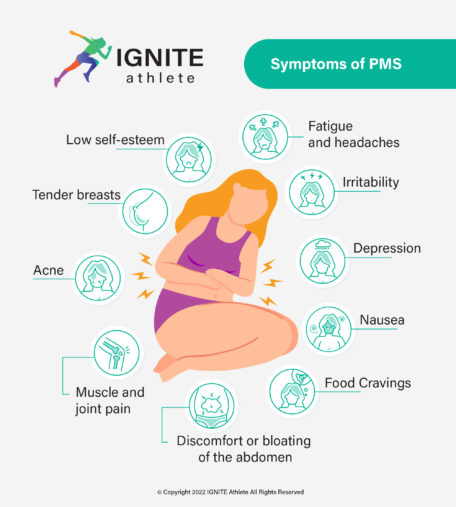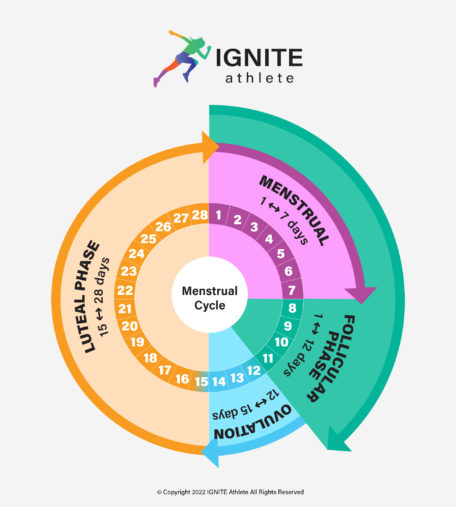Module aims
- Provide further information regarding pre-menstrual syndrome (PMS) and the common sign and symptoms associated with the condition
- Provide insight on common ways PMS symptoms may impact training and performance
- Discuss options for the self-management of PMS and when to seek further help from a medical practitioner
What is premenstrual syndrome?
Premenstrual Syndrome, most commonly known as PMS, includes a wide range of physical and psychological symptoms that affects around 75% of athletes who have periods, around a week before their period begins. Even though people often joke about the condition, it can actually have a big impact on person’s life and athletic performance.
What is the cause of PMS?
While the cause of the syndrome remains unknown, there are a number of factors contributing to complex conditions’ presentation. These factors include:
- Hormone levels fluctuating, influencing neurotransmitters like serotonin
- Sensitivity to the hormone progesterone in those with low levels of serotonin
- Overactive prostaglandins (lipids that form near tissue damage and infection sites)
- A genetic link – PMS is found to be two times more prominent among identical twins than fraternal twins
 Signs and symptoms
Signs and symptoms
PMS symptoms range from behavioural to psychologic to physical with the onset beginning in the luteal phase of the cycle and subsiding once menstruation begins.
More than 200 symptoms have been linked to PMS; however, the following symptoms are the most common:
- Fatigue
- Headaches
- Sensitive or swollen breasts
- Abdominal discomfort (cramping or dull ache)
- Abdominal bloating
- Water retention
- Muscle and joint pain
- Nausea
- Food cravings
- Mood swings
- Irritability
- Depression
- Low self-esteem
How can PMS be diagnosed?
Although your doctor can’t test you for PMS with a diagnostic screening tool, your doctor can assess your symptoms and medical history to achieve a diagnosis. During this process, tracking your period for at least two period cycles is recommended to confirm what symptoms you experience and when.
 How does it influence athletic performance?
How does it influence athletic performance?
While the research is continuing to grow in this area, research suggests that PMS symptoms may negatively affect your performance in the late luteal phase of your menstrual cycle.
Please note each athlete may perceive their performance and training to be different in each phase and may not necessarily experience all these impacts at the same level. Therefore, tracking your menstrual cycle and documenting how you think, feel, and perform during the different stages of your cycle is so important.
Common methods of managing these symptoms include taking tranexamic acid or contraceptive options such as the oral contraceptive pill or Mirena.
To learn more about how to manage your cycle, visit our menstrual cycle management strategies module or contact a specialised doctor from Ignite Athlete
How is PMS treated and managed?
When it comes to PMS, there’s no singular cure, but there are ways to manage your symptoms. While we recommend the following tools, we suggest you speak to your doctor and other members of your support team (dietician, physiotherapist) to ensure the tools fit your sporting guidelines.
The recommended tools include:
Lifestyle changes
- Ensure you are getting sufficient sleep
- Engaging in a consistent exercise routine
- Avoid smoking
- Reduce caffeine and alcohol intake during your luteal phase
Dietary changes
- Eating smaller portions of food more often
- Decreasing your salt intake
- Increase your diary intake
- Increasing your fruit and vegetable intake
Supplement use
- Vitamin A, E and B6
- Magnesium
- Calcium
- Evening primrose oil
Medication
- Prescription of SSRIs (selective serotonin reuptake inhibitors)
- Prescription of the oral contraceptive pill
- Menstrual and ovulation suppression medication
For more information on managing your menstrual cycle, visit our Menstrual Cycle Management Strategies page
Should I see a doctor?
If you have concerns about PMS impacting your life and athletic performance, we encourage you to get in touch with Ignite Athlete. We have a network of specialised General Practitioners, fertility specialists and gynaecologists across Australia who will be more than happy to speak with you and discuss your individual circumstances.
With over 50 dedicated specialists across 70 consulting locations throughout the country, our friendly staff can help you choose the right medical professional to guide you and help you achieve your sporting goals. Contact Ignite Athlete now.
Summary
- PMS is an extremely common condition that occurs approximately a week before the onset of a period which encompasses a range of physical and psychological symptoms.
- Symptoms can vary widely between athletes and tracking your menstrual cycle can help monitor the changes and symptoms you experience.
- There are many ways to manage PMS symptoms with methods such as lifestyle changes, dietary changes, supplement use and medication.

